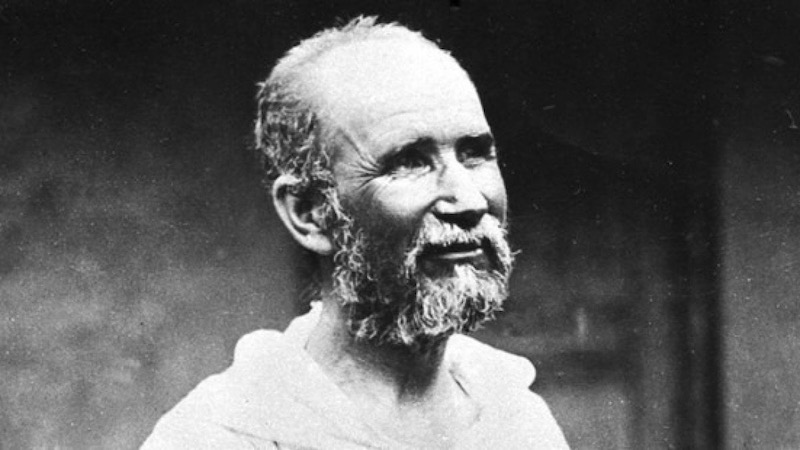Charles de Foucauld, the priest, hermit and martyr who spent many years in North Africa, and is soon to be declared a saint, offers to the Church a model for its relationship with Islam and ministry in Muslim-majority countries. And he also provides some practical lessons for the work of evangelisation.
Born into an aristocratic French family, Blessed Charles (1858-1916) turned away from the Catholic faith of his childhood and embarked on a dissolute life. He then trained as a soldier and served in Morocco and Algeria.
Although some have argued de Foucauld was too closely linked to colonial powers, his encounter with devout Muslims in North Africa helped rekindle his faith.
“Islam shook me profoundly,” he wrote, “the sight of their faith, of these people living in God’s constant presence, afforded me a glimpse into something greater and truer than earthly preoccupations.”
At a time when political strategists, and some inside the Church, wish to present a “clash of civilisations” between Islam and Christianity and call for the “Judaeo-Christian” west to be defended, de Foucauld offers another way. His life journey shows that it is not “other” religions which need to be battled against but indifference, or lack of faith.
The French soldier-monk spent several years as a Trappist before moving to Beni Abbes, an oasis on the Moroccan border, where he built a small monastery, the Fraternity of the Sacred Heart of Jesus. Here he sought to witness to the radical inclusivity of Christianity.
“I want all the inhabitants, be they Christian, Muslim or Jewish, to look on me as their brother, the universal brother,” he said.
“Above all, always see Jesus in every person, and consequently treat each one not only as an equal and as a brother or sister, but also with great humility, respect and selfless generosity.”
Although he received a large number of guests to the monastery, he was unable to attract any followers to join his fraternity – it was, by worldly standards, a failure.
In the last 15 years of his life, de Foucauld went further into the peripheries working among the Muslim Tuareg population of the Ahaggar region and became an expert in their language and culture. He translated more than 600 Tuareg poems and songs, and the bible into the Berber language.
De Foucauld shows that the Church should not measure itself on the “numbers game” of instant success but in the integrity of witness which bears fruit in the long term. Some years after his death a religious congregation, the Little Brothers of Jesus, was established, taking de Foucauld’s as their inspiration.
Being a witness amid difficulties is an attribute of the North African church epitomised by the Tibhirine monks, the Trappist community in Algeria who served their Muslim neighbours but then saw seven of them assassinated. They, like de Foucauld, are now recognised as martyrs.
During a trip to Morocco last year, Pope Francis met Father Jean-Pierre Schumacher, 96, the last surviving monk of the Tibhirine community.
“I believe we should worry whenever we Christians are troubled by the thought we are only significant if we are the flour, if we occupy all the spaces,” Francis told a gathering at the Cathedral of Saint-Pierre in Rabat, with Fr Jean-Pierre among them. “You know very well that our lives are meant to be ‘yeast’, wherever and with whomever we find ourselves, even if this appears to bring no tangible or immediate benefits.”
Finally, de Foucauld showcased “ministry of presence”, by seeking to meet people and cultures where he found them. It is an evangelisation method which is the opposite of proselytising. Living in a Muslim country he did not seek to preach, or perform great acts of bravado but to live at the foot of the cross.
“His vocation was one of being present among people with a presence willed and intended by a witness of the love of Christ,” wrote René Voillaume, in Seeds of the Desert: the Legacy of Charles de Foucauld.
His focus on being, rather than doing, offers the Church a way of evangelising, particularly in light of the Covid-19 pandemic, which has seen the everyday activities of ecclesial life dramatically curtailed. De Foucauld offers a vital lesson that God is before God acts.
His desire to be present was motivated by a radical humility: he identified with the Christ who was obscure and forgotten.
“Jesus descended to them and came to Nazareth,” de Foucauld wrote. “Throughout his life, he descended: by becoming flesh, by becoming an obedient little child, by becoming poor, abandoned, exiled, persecuted, tortured, by always putting himself in the last place.”
The soon to be St Charles de Focauld will be interceding in heaven for a humbler Church, less focussed on the appearances of success and more on becoming a model of dialogue and charity.



 Loading ...
Loading ...
What do you think?
You can post as a subscriber user ...
User comments (0)